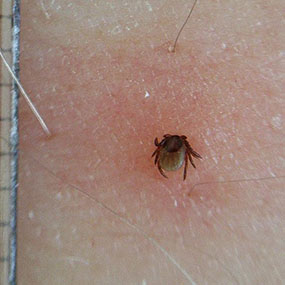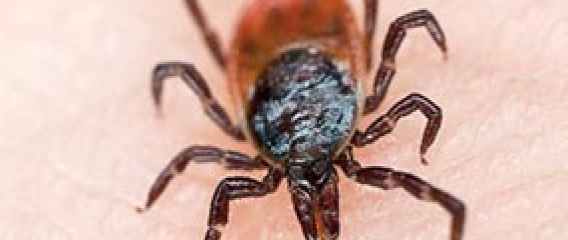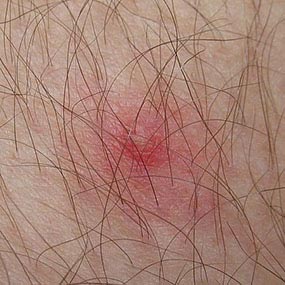Tick Bites: Symptoms and Treatments
Ticks are common throughout the United States. They live outdoors in grass, trees, shrubs, and leaf piles. Unfortunately for us, they’re attracted to people and their four-legged pets, and can easily move between the two. If you’ve spent any time outdoors, you’ve likely encountered ticks at some point.
Tick bites are often harmless, in which case they do not cause any noticeable symptoms. However, some tick bites can be dangerous or even deadly. Learn how to recognize ticks, symptoms of tick-borne illnesses, and what to do if a tick bites you.
What are ticks?
Ticks are small, blood-sucking bugs. They can range in size from as small as a pin’s head to as large as a pencil eraser. Ticks have eight legs. They are arachnids, which means they are related to spiders. The different kinds of ticks can range in color from shades of brown to reddish brown and black.
As they take in more blood, ticks become larger and larger. At their biggest, ticks can be about the size of a marble. After a tick has been feeding on its host for several days or weeks, they become engorged and can turn a greenish blue color.
Ticks prefer warm, moist areas of the body. Once a tick gets on your body, they are likely to migrate to your armpits, groin, or hair. When they are in a desirable spot, they bite into your skin and begin drawing blood.
Unlike most other bugs that bite, ticks typically remain attached to your body after they bite you. If one bites you, you will likely know because you found a tick on your skin. After a period of several days or weeks of drawing blood from your body, an engorged tick can detach itself and fall off.
Symptoms of tick bites:
Tick bites are usually harmless and may produce no symptoms.
However, if you are allergic to tick bites, you may experience pain or swelling at the bite site, a rash, burning sensation, blisters, or even difficulty breathing.
Some ticks carry diseases, which can be passed on when they bite. Tick-borne diseases can cause a variety of symptoms, and usually develop within the first few weeks after a tick bite. Potential symptoms of tick-borne diseases include:
- red spot or rash near the bite site
- neck stiffness
- headache or nausea
- weakness
- muscle or joint pain or achiness
- fever or chills
- swollen lymph nodes
Be sure to seek medical attention immediately if a tick bite results in serious symptoms.
Can tick bites cause other problems?
In rare cases, ticks can transmit a disease to human hosts. These diseases can be very serious. Most signs or symptoms of a tick-borne disease will begin to occur within the first few weeks after a tick bite. If you begin experiencing unusual symptoms, it’s important that you seek medical care and let your doctor know that a tick recently bit you. He or she may conduct tests to determine whether your symptoms are the result of a tick-borne disease.
Here, a list of disease that can be transmitted to you through a tick bite:
- Lyme disease
- Colorado tick fever
- Rocky Mountain spotter fever
- tularemia
- ehrlichiosis
How are bites treated?
The most important thing to do when you find a tick on you is to remove it. You can remove the tick yourself with a tick removal device or a set of tweezers. Grasp the tick close to the skin’s surface. Pull away from the skin, trying not to bend or twist the tick. Check the bite site to see if you left any of the tick’s head or mouthparts in the bite. If so, remove those. Clean the bite site with rubbing alcohol or soap and water.
You do not need to take medicine or see a doctor for a tick bite unless you begin developing symptoms or do not want to remove the tick yourself. If you remove the tick yourself, be aware of any unusual symptoms, which might indicate you may have contracted a tick-borne illness as a result of the bite.




























